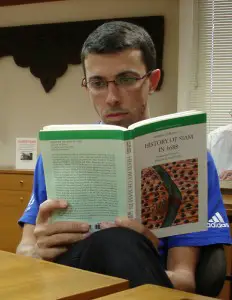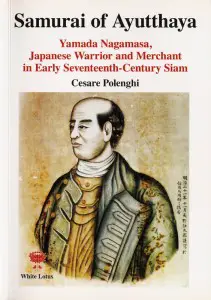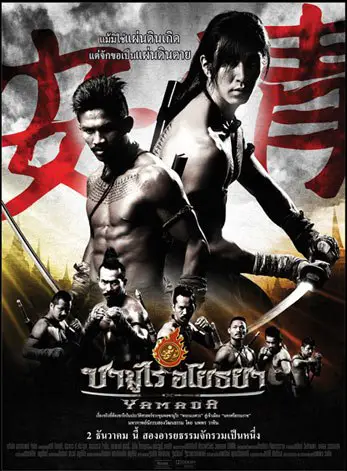 Cesare Polenghi is an Italian-born researcher and professor who was born in 1968, Milano, Italy. His extensive career as a teacher in Japan and as a graduate and undergraduate student in Asian Studies and History makes him one of the emerging voices in the field of Japanese studies. His book Samurai of Ayutthaya: Yamada Nagamasa, Japanese Warrior and Merchant in Early 17th Century Siam (White Lotus, 2009) is the very first monograph in English about the Japanese community that was active in Siam. In this interview, he talks about his interest in Japan and Siam, as well as his writing projects.
Cesare Polenghi is an Italian-born researcher and professor who was born in 1968, Milano, Italy. His extensive career as a teacher in Japan and as a graduate and undergraduate student in Asian Studies and History makes him one of the emerging voices in the field of Japanese studies. His book Samurai of Ayutthaya: Yamada Nagamasa, Japanese Warrior and Merchant in Early 17th Century Siam (White Lotus, 2009) is the very first monograph in English about the Japanese community that was active in Siam. In this interview, he talks about his interest in Japan and Siam, as well as his writing projects.
Voicu Mihnea Simandan: Your book about “the rise and fall” of Yamada Nagamasa represents your debut as a well-established researcher. How did this project start?
Cesare Polenghi: It was my MA thesis when I was a graduate student at University of Hawaii. My teachers and others who read it thought it was good, so I was encouraged to send copies to editors. I had to thank a lot of people in my book, because I could have never done it without them. I am still very grateful, in particular to Dr. Varley, who was my “godfather.”
VMS: Tell us about the difficulties in finding accurate and reliable primary and secondary resources about Yamada Nagamasa?
CP: The main difficulty is that the sources are scant and written in many different languages. I had to learn Portuguese and to get help for Thai and 17th century Dutch. Other than that, there were writings in Spanish, French, Italian and of course Japanese. In many cases I had to skim-read a whole book to find a paragraph that was relevant to my research. It helped that after I had completed gathering all sources I had a few months only for reading, organizing and finally writing.
VMS: Why did you choose the Southeast Asian region, particularly Siam, as the main topic for your study?
CP: Thailand is a very special place. It has never been a colony, it has a very unique identity. It is also the first place I ever visited in Asia and where I spent my honeymoon (laugh!). So, from a personal point of view, I really do like “Siam” a lot.
As a historian, I was fascinated by the international dimension that Ayutthaya had already reached in the 16th/17th centuries. Plug in a bunch of ronin from Japan, and surely enough you have a good (hi)story!
 VMS: For you, as a researcher and aficionado of Japanese history, who was Yamada Nagamasa?
VMS: For you, as a researcher and aficionado of Japanese history, who was Yamada Nagamasa?
CP: Yamada Nagamasa was a smart and bold emigrant who made it big, but met a tragic fate. He must have been quite a character. I am sure I would have got along well with him, since I have been an emigrant basically most of my life.
VMS: How was the book received? Will there be a Thai or Japanese translation?
CP: History monographs are seldom international bestsellers, but all reviews have been very positive, and I have been contacted by many scholars asking for help. That made me very happy. Thai or Japanese version? That would be awesome. Anybody wants to translate it?
VMS: To complete your research, you visited the reconstructed Japanese Village in Ayutthaya, Thailand. How did it feel to be on location, having in mind that you were in possession of so much historical data about the life of the Japanese community in 17th century Siam?
CP: I went on a typical hot and humid day, I was listening to Thai traditional music on my iPod and I spaced-out a bit. Sure, I could “feel the presence” of Nagamasa. It was very emotional to walk on the same streets and to visit the Japanese Village. I think that everybody who writes a history book should visit the places where the events described took place. I was in Shizuoka as well, and I also tried to get on a boat to travel by sea from Japan to Thailand, but sadly that was not doable.
VMS: When you were in the process of finishing off your book, a movie about Yamada Nagamasa was being made. Have you seen Yamada: The Samurai of Ayothaya (2010, Dir. Nopporn Watin)?
CP: Unfortunately I haven’t seen it yet. I don’t think it is available in Japan, where I dwell now. I have seen the preview. It looks like a lot of bones are cracked in the movie!
VMS: Why is it that the former capital of Siam has so many different spellings (i.e. Ayutthaya, Ayothaya, Ayudhaya, etc.)?
CP: I believe it just boils down to the fact that until relatively recent times there was no agreement on how to romanize Thai language.
 VMS: What are you working on at the moment?
VMS: What are you working on at the moment?
CP: Something completely different: The History of Japanese Professional Football. History and football have always been my passions. I got both of them from my dad. He too was a historian, and a sport journalist.
VMS: When will you publish another book?
CP: I hope in 2012…? Oh, that is only one year away! I gotta speed up! (laugh).
VMS: In the light of the recent natural and nuclear disasters that have stuck Japan, what thoughts do you have for the Japanese people? Have your family and friends been affected?
CP: I live in Kansai, in southern-central Japan, and nothing at all happened here. It was weird to see all those images on TV; it is like all took place in another country. Life here went on as usual. We went to work, food was on the shelves, no radioactive spills…
Of course, we all did what we could to collect money for those hit by the disaster. I was involved in some football-related charity games and events. We all really hope that those who survived could go back to a happy life as soon as possible.
VMS: Japanese companies have a strong foothold in Thailand. Where do you see the future of the Thai-Japanese relations?
CP: Thai and Japan share a lot. Until the US occupation of Japan in 1945, they were the only two Asian countries that had never been permanently invaded by foreigners, and they both have a strong Buddhist heritage. I think both countries respect and share a reciprocal interest in each other. Many Japanese love to travel to Thailand, and now some Thai are beginning to come to Japan. I am not really an expert on contemporary trade relations, I just hope they help to create good vibes between the countries and help both economies to grow, while respecting the people and the environment.
VMS: When will you visit Thailand again?
CP: When will you invite me?
VMS: Thank you for your time and I’m looking forward to reading your future books.
CP: Khop khun krap, a big hug to everybody in Thailand.
Watch a video presentation of the Japanese Village in Ayutthaya, Thailand:
Voicu Mihnea Simandan
Bangkok, Thailand
March 30, 2011

